The re-election this week of Poland’s pro-market and pro-European Prime Minister Donald Tusk made headlines for marking the first time in the nation’s post-communist era that a ruling party has won two consecutive terms. The victory confirms Tusk’s place at the forefront of a Polish political landscape still burdened by last year’s horrific national tragedy that saw President Lech Kaczynski and dozens of other top political and military leaders perish in a plane crash. But it also reflects Tusk’s success at positioning Poland as a key intermediary within Europe’s greater geopolitical landscape, says Jana Kobzova, the coordinator of the Wider […]
Diplomacy & Politics Archive
Free Newsletter
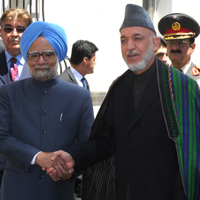
The strategic partnership agreement signed by Afghan President Hamid Karzai and Indian Prime Minister Manmohan Singh in New Delhi last week made front-page news across the region and beyond. The attention it attracted is hardly surprising: The agreement, the first of its kind for Afghanistan, includes the provision of training for Afghanistan’s military and police, the establishment of social and cultural exchanges, and measures to enhance economic ties. It also comes in the context of increasing tensions between Afghanistan and Pakistan. A day prior to the announcement, Karzai harshly criticized Islamabad for not supporting ongoing peace and stability operations in […]
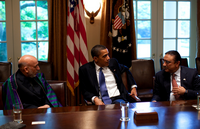
With a variety of major political and military events unfolding across Asia and the Middle East, many countries are re-examining longstanding formal and informal partnerships and alliances. As a result, the coming months and years will bring about a recasting of important strategic links, some of which have been part of the global landscape for decades. The combined effect of America’s war in Afghanistan, its fight against Muslim extremists inside Pakistan and the ongoing Arab uprisings are prompting a fundamental rethinking of some of the bilateral and multilateral ties that have served as the bedrock of international affairs in recent […]
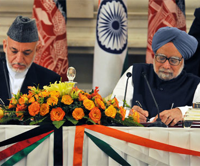
In a move that signals India’s resolve to stay the course in Afghanistan after NATO troops withdraw in 2014, Indian Prime Minister Manmohan Singh signed a Strategic Partnership Agreement (SPA) with visiting Afghan President Hamid Karzai in New Delhi last week. The SPA includes a major security component, with India “agreeing to assist, as mutually determined, in the training, equipping and capacity-building programs for Afghan National Security Forces.” That this was the first security pact of any kind signed by India on the subcontinent was not lost on Islamabad, with former Pakistani President Pervez Musharraf immediately dubbing the pact “anti-Pakistan.” […]
Liberians have gone to the polls in large numbers for the second presidential election held since the nation was gripped by civil war. The country’s election commission says results are due Thursday in the contest pitting Nobel Peace Prize recipient and incumbent Ellen Johnson Sirleaf against former diplomat Winston Tubman.
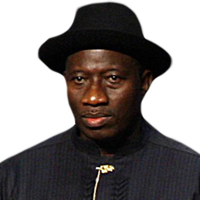
PORT HARCOURT, Nigeria — On Oct. 2, Nigeria celebrated the 51st anniversary of its freedom from British rule. A large gala was planned in Abuja, the fast-growing Nigerian capital located in the center of the country. But, days before the celebrations, Boko Haram, a Muslim extremist group based in the country’s north, and the Movement to Emancipate the Niger Delta (MEND), based in the country’s oil-rich south, both threatened to disrupt the festivities with violence. Boko Haram had already made it clear that it was capable of attacking Abuja on Aug. 26, when it exploded a bomb at the United […]

Is the world about to see a “drone race” among the United States, China and several other major powers? Writing in the New York Times, Scott Shane argued that just such an arms race is already happening and that it is largely a result of the widespread use of drones in a counterterror role by the United States. Shane suggests that an international norm of drone usage is developing around how the United States has decided to employ drones. In the future, we may expect that China, Russia and India will employ advanced drone technologies against similar enemies, perhaps in […]
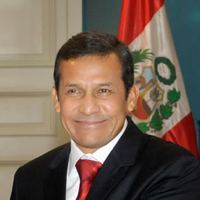
In June 2011, Ollanta Humala was elected president of Peru after campaigning on a platform of change. Significant for Peru, but also for South America more broadly, Humala advocated for moderate, not revolutionary, change — calling for a better and fairer distribution of the fruits of Peru’s impressive economic growth and for lower levels of corruption and crime. That kind of program won’t entail upending the prevailing system. It will, however, require serious institutional reform. The Peruvian case dramatically illustrates wider trends in South America, where sustained economic growth and sound macroeconomic policymaking in recent years have coexisted with continuing […]
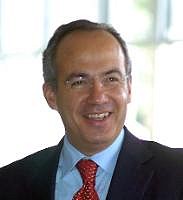
When Mexico’s secretary of foreign affairs, Patricia Espinosa, recently acknowledged that Brazil is dragging its feet on the free trade deal the two countries agreed to hash out last November, it was not the lament of an aggrieved party. After all, Mexico, Latin America’s second-largest economy, is hardly a victim in its trade relations with Brazil, the region’s largest. To the contrary: In the first seven months of 2011, Mexico registered a $478 million trade surplus with Brazil, a 24-fold increase over the $19 million registered during the same period in 2010. That might explain Brazil’s lack of enthusiasm for […]

Russian Prime Minister Vladimir Putin followed up his unsurprising Sept. 24 declaration that he would again seek the presidency with a more surprising call: to create what he called a “Eurasian Union.” In a rare and lengthy newspaper piece published on Oct. 4, Putin announced his desire for Russia to again lead a multinational bloc of tightly bound, former Soviet republics. But major obstacles stand in the way of Putin’s project, and the prospects of a new Eurasian Union emerging anytime soon in the former Soviet space are small. Putin’s press secretary, Dmitry Peskov, told the influential Kommersant newspaper that […]
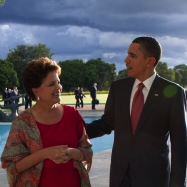
Recent developments in South America have upended the United States’ historical — and often misguided — tendency to lump the region into a one-size-fits-all policy. A politically and economically muscular Brazil, the rise of an anti-American bloc of countries led by Venezuela, and the emergence of economic and even political extraregional rivals in the hemisphere have created a more diverse, independent and contentious region for the United States. At the same time, the looming shadow of a double-dip U.S. recession and the spectacle of partisan intransigence leaving Washington paralyzed have led to an overwhelming impression across the region that the […]
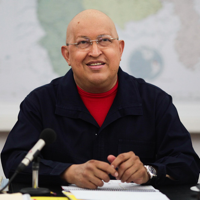
One of the subjects dominating discussions of Latin American politics this year has been the June 30 revelation that Venezuelan President Hugo Chávez is being treated for cancer. Very little is known about his illness, other than the not-so-encouraging news that he has received four, possibly five, chemotherapy treatments, most them in an undisclosed location in Cuba. A bombshell accompanied by such secrecy has raised speculation about the future of Venezuelan politics. It seems that all scenarios, ranging from Chávez’s death to his full recovery, are possible, which makes the presidential election scheduled for October 2012 one of the most […]
A free trade agreement between Israel and Mercosur entered into force in September, following Argentinian approval of the deal in August. In an email interview, Arie M. Kacowicz, a professor of international relations at the Hebrew University of Jerusalem, discussed Israel-South American relations. WPR: What is the recent history of Israel’s diplomatic relations with South America? Arie M. Kacowicz: Israel has managed to maintain cordial diplomatic relations with most of the countries of South America, with the exception of Venezuela, Bolivia and Ecuador, with which relations deteriorated following the Second Lebanon War of 2006 and the war in Gaza of […]
With North and South Korea technically still at war after more than 60 years, a possible reunification of the two remains hindered by vast ideological differences and recent military altercations. However, South Korea continues to entertain the notion and is now promoting a government-funded Internet news outlet that advocates reunification with the North.
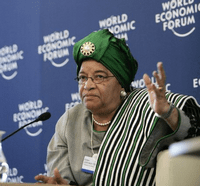
MONROVIA, Liberia — In her 2006 inauguration speech, with Liberia still reeling from civil wars that had lasted from 1989 to 2003 and killed more than 250,000 people, President Ellen Johnson-Sirleaf referred to a greeting children here use when their fathers return home from work — or, as is common in Liberia, from trying to find it: “Papa na come.” “Well, too many times, for too many families, Papa comes home with nothing,” said Johnson-Sirleaf, Africa’s first elected female head of state. “We will work to ensure that when our children say ‘Papa na come,’ Papa will come home joyfully […]
